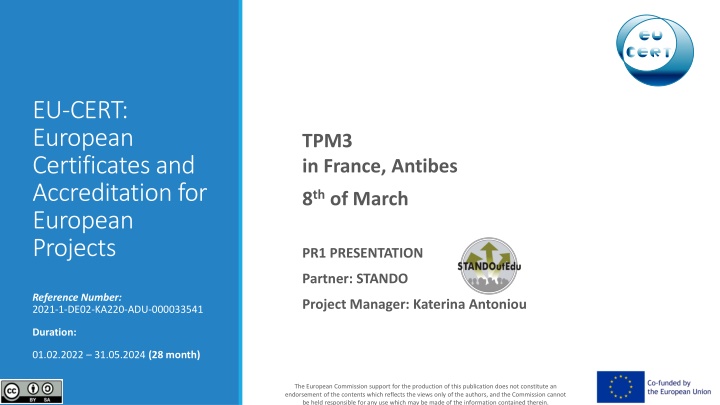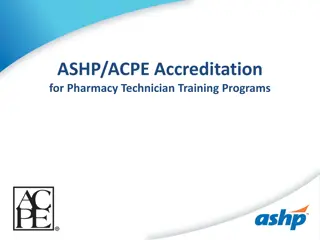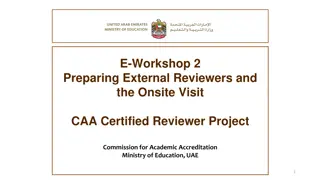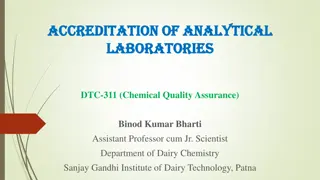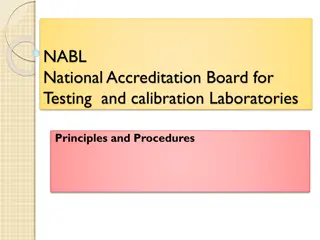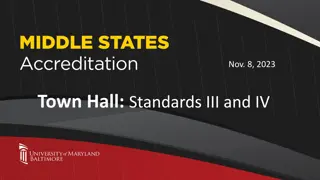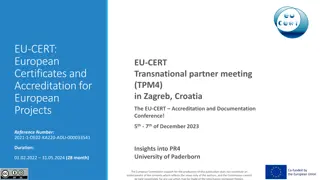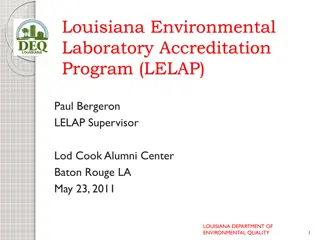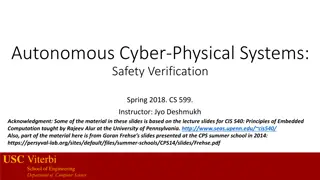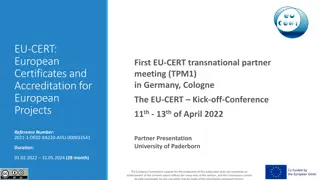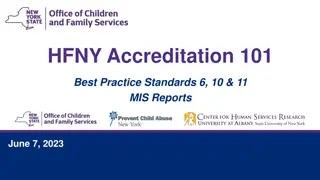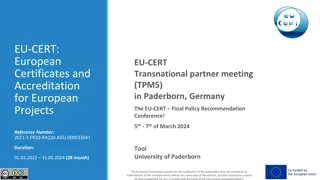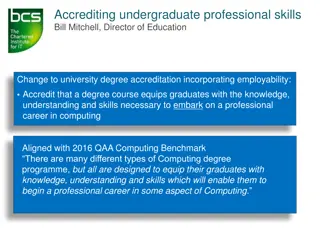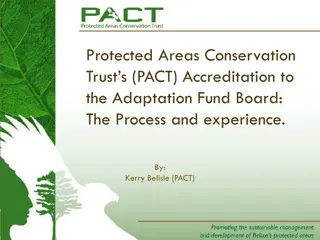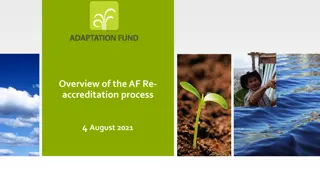European Certificates and Accreditation for European Projects TPM3 in France
This project, led by Project Manager Katerina Antoniou, focuses on conducting research on quality criteria, accreditation, and certificate structures for European projects. It involves a mixed-methods design with quantitative and qualitative research components, including expert interviews and desktop research in partner countries. The project aims to enhance quality assurance in programs like ERASMUS+ through the exploration of necessary quality criteria and certification elements.
Download Presentation

Please find below an Image/Link to download the presentation.
The content on the website is provided AS IS for your information and personal use only. It may not be sold, licensed, or shared on other websites without obtaining consent from the author.If you encounter any issues during the download, it is possible that the publisher has removed the file from their server.
You are allowed to download the files provided on this website for personal or commercial use, subject to the condition that they are used lawfully. All files are the property of their respective owners.
The content on the website is provided AS IS for your information and personal use only. It may not be sold, licensed, or shared on other websites without obtaining consent from the author.
E N D
Presentation Transcript
EU-CERT: European Certificates and Accreditation for European Projects TPM3 in France, Antibes 8th of March PR1 PRESENTATION Partner: STANDO Reference Number: 2021-1-DE02-KA220-ADU-000033541 Project Manager: Katerina Antoniou Duration: 01.02.2022 31.05.2024 (28 month) The European Commission support for the production of this publication does not constitute an endorsement of the contents which reflects the views only of the authors, and the Commission cannot be held responsible for any use which may be made of the information contained therein.
Project Project Result Result1 1 EU-CERT - RESEARCH ON QUALITY CRITERIA, ACCREDITATION AND CERTIFICATE STRUCTURES The European Commission support for the production of this publication does not constitute an endorsement of the contents which reflects the views only of the authors, and the Commission cannot be held responsible for any use which may be made of the information contained therein.
Project Project Result Result1: Mixed 1: Mixed- -Methods Design Methods Design Project result 1 (PR1) - EU- CERT - Research on Quality criteria, Accreditation and Certificate Structures" comes with Quantitative Research: Qualitative Research: (III) broad questionnaire on quality assurance with regard to ERASMUS+ and necessary quality criteria as well as existing certification elements (I) desktop research in each partner country and (II) combines this with 5 expert interviews in each country The European Commission support for the production of this publication does not constitute an endorsement of the contents which reflects the views only of the authors, and the Commission cannot be held responsible for any use which may be made of the information contained therein.
Higher Education System in Cyprus Higher Education System in Cyprus State University State extra-University Tertiary Education Institutions Private extra-University Tertiary Education Institutions The European Commission support for the production of this publication does not constitute an endorsement of the contents which reflects the views only of the authors, and the Commission cannot be held responsible for any use which may be made of the information contained therein.
o No accreditation process for State Institutes o No intention to categorize educational institutions or programs as excellent, average, or poor Accreditation Process Accreditation is the process of ensuring that the accredited institution or program meets the minimum requirements set by the accreditation standards and criteria, indicating an acceptable level of quality Cyprus accreditation system only refers to private tertiary education institutions The European Commission support for the production of this publication does not constitute an endorsement of the contents which reflects the views only of the authors, and the Commission cannot be held responsible for any use which may be made of the information contained therein.
Accred Accreditation itation Council Council Implements the accreditation process Makes the final decision on accreditation of an educational program Appoints the accreditation Visiting Teams, Reviews their final recommendations Decides whether to accredit, deny or postpone the decision on accreditation The European Commission support for the production of this publication does not constitute an endorsement of the contents which reflects the views only of the authors, and the Commission cannot be held responsible for any use which may be made of the information contained therein.
Accreditation Standards and Criteria Accreditation Standards and Criteria i. Institutional Goals and Mission ii. Academic Programs iii. Teaching Personnel iv. Supporting Services, Buildings, and Facilities v. Organization and Administration vi. Financial Resources The European Commission support for the production of this publication does not constitute an endorsement of the contents which reflects the views only of the authors, and the Commission cannot be held responsible for any use which may be made of the information contained therein.
The Cyprus Agency of Quality Assurance The Cyprus Agency of Quality Assurance Evaluation and accreditation of higher education institutions, departments, and programs Quality assurance in higher education using European Standards Cross-border forms of education offered by local institutions in member states or third countries are evaluated and accredited Evaluation of the conditions for cross-border education from foreign institutions in Cyprus Evaluation of higher education institutions' inter-institutional cooperation The dissemination of information about quality assurance in higher education The European Commission support for the production of this publication does not constitute an endorsement of the contents which reflects the views only of the authors, and the Commission cannot be held responsible for any use which may be made of the information contained therein.
Adult Education will be much more important in 5 years: people tend to focus to personal development 5 Expert Interviews: Summary of most common answers Life-long learning is becoming important aspect for many individuals Trainer s knowledge and expertise affects AEP s quality Experts have over 10 years of experience in AEPs. Inclusion for people with disabilities is not achieved They have participated in all different roles (fascilitators, educators, participants etc) AEPs can be very generic and that is not always efficient People of marginalized backgrounds/working class are not always well-targeted or included The European Commission support for the production of this publication does not constitute an endorsement of the contents which reflects the views only of the authors, and the Commission cannot be held responsible for any use which may be made of the information contained therein.
Suggestions Suggestions PROCESS CONTENT Simplify processes for securing funds and make them made more transparent o Keep up with new trends Focus on the quality of the trainers o Customize material based on the needs of the participants Train the trainers, and assign experts with the appropriate positions o Focus on certain skills Intensify investments in AEP o Take into consideration disabilities and marginalized groups Establish a framework for validating, accrediting and recognizing educational qualification across formal, non o Use technology-tailored made application and formal and informal education generic skills The European Commission support for the production of this publication does not constitute an endorsement of the contents which reflects the views only of the authors, and the Commission cannot be held responsible for any use which may be made of the information contained therein.
oEffective strategies for enhancing basic skills are partially included oDevelopment of basic and transversal skills by using innovative methods partially integrated Quantitative Research oThey all agree that AEP promote EU citizenship oIn general the AEP focuses on the importance of the open examination of 29 participants foreign cultures and dealing with cultural differences and similarities by 25 of the participants are adult trainers focusing on EU-citizenship and international shared values and identities 18 work at vocational schools, 6 are university students and 5 work in Secondary Education oThe educator is able to help the participants with problems concerning digital work and use of digital media They participated in different roles each time and experienced different topics oThe programmes tend to focus more on regional content and soft skills The European Commission support for the production of this publication does not constitute an endorsement of the contents which reflects the views only of the authors, and the Commission cannot be held responsible for any use which may be made of the information contained therein.
Quality is not always achieved Trainers don t always have the appropriate training Some programmes are not taken seriously by the participants People with dissabilities or coming from marginalized groups are not considered/included Suggestions Main concerns & Suggestions Customize the material based on the needs of the participants Create inclusive material and take into consideration dissabilities and marginalized groups Establish accreditation process so that more participants are involved and the quality is improved Prepare the trainer and target certain skills Improve the quality through establishing criteria for participation The European Commission support for the production of this publication does not constitute an endorsement of the contents which reflects the views only of the authors, and the Commission cannot be held responsible for any use which may be made of the information contained therein.
STANDO Project Manager: Katerina Antoniou https://standoutedu.com/ The European Commission support for the production of this publication does not constitute an endorsement of the contents which reflects the views only of the authors, and the Commission cannot be held responsible for any use which may be made of the information contained therein.
